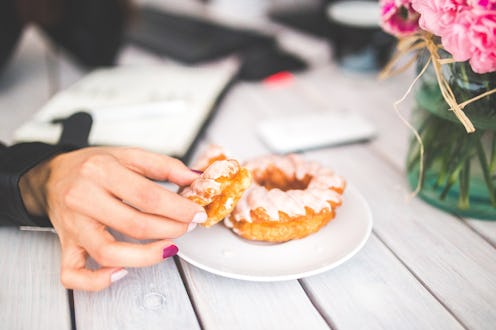Life
11 Signs Your Diet Might Be Making You Tired

When you're low on energy, your might blame your sleep or a long work day, but you're probably not thinking much about what you've been eating. However, food can play a role in your energy levels, and you may be exhibiting some signs that your diet is making you tired. Food does more than just keep you full, and it can help you feel more awake and alert — or more fatigued and exhausted — depending on what you're eating.
"Diet is directly related to our energy levels," says nutritionist Frances Largeman-Roth over email. "You need to eat consistent, balanced meals with healthy snacks that include a combination of healthy carbohydrates, fats, protein and fiber to keep your blood sugar steady and help you feel full and ready to take on the day."
Considering about 90 percent of Americans don't eat enough fruits and vegetables, according to Live Science, it's no surprise that many people tend to feel tired or fatigued. To feel our best, we need to start tweaking our everyday meals.
If you feel like your energy levels are lower than you would like, and you're not sure what to blame, consider these 11 signs that your diet is making you tired.
1. You Let Yourself Get Starving
"This is an excuse that many busy professionals use," says Susie Garcia, RDN over email. They are on the go and they don't have time to stop for lunch. But these are also the same people that complain about being worn out and tired every day." Going too long without food can cause a drop in blood sugar, which can make you feel tired. WebMD recommends eating every three to four hours to prevent feeling so hungry and energy deficient.
2. You Need Lots Of Coffee To Get You Through The Morning
If you constantly rely on caffeine to get you throughout the day, your diet may not be supplying you with enough natural energy. "Stimulants, like caffeine, are not the same as fuel — they will give you a feeling of energy, but over-use will actually cause exhaustion," says Garcia.
3. You Skip Breakfast
Many people forego breakfast in favor of sleeping in a little bit extra or having more time to get ready in the morning. But skipping out on breakfast means skipping out on important nutrients that provide you with enregy that help you feel awake. One study from International Journal of Food Sciences And Nutrition found that people who ate a high-carbohydrate breakfast reported feeling more alert.
4. You Eat All Your Meals Out
"When your body isn't 'nourished' with essential vitamins and minerals, you might find yourself eating larger quantities of junk food — because your body isn't getting satisfied," says Garcia. Even if you're not eating a lot of fast food, many restaurant meals contain a lot of trans fat, salt, and sugar, which can all bring down your energy levels.
5. You're Craving Sugar
If you're constantly craving sweets, it's your body's way of telling you you need more fuel. "This generally will mean that you are not eating enough protein with your meals, and your body is looking for a quick fix," says Garcia. Instead of reaching for sugar, which can leave you feeling more lethargic, look for a snack that contains a balance of protein and fiber.
6. You Shun Fruit
Sugar is essential for energy, but as long as it's the right kind. If you're not eating enough fruit, you're likely not getting in any necessary natural sugars. Stick to high-fiber fruits for long-lasting energy, as well as fruits that are high in B vitamins and potassium, according to Livestrong.
7. You've Cut Out All Carbs
If you're on a diet that has you cutting out all carbohydrates, it's no surprise you're feeling tired. Carbohydrates, especially complex carbohydrates, are your body's main source of energy, so skip the white bread and pasta and stick to oatmeal and other whole grains instead.
8. You're Not A Fan Of Greens
Sure, most people don't run around claiming broccoli is their favorite food, but if you're staying far away from any type of green, you're not going to feel super energetic. Cruciferous vegetables such as broccoli, kale, and cauliflower contain a wide variety of nutrients that help fight fatigue.
9. You Have Bathroom Issues
"You probably don't think that bowel movement problems are related to your energy levels," says Garcia. "But if you have any type of GI (gastrointestinal) issues it can completely zap your energy, and the GI problems are likely related to your dietary choices. If you are not drinking enough water or eating enough fiber, you will be constipated; if you eat too much sugar that can cause diarrhea."
10. You Might Be Anemic
Fatigue is a symptom of anemia, an iron-deficiency. In addition to upping your intake of iron-rich foods, you might want to focus on also getting more vitamin C. "Vitamin C helps improve iron absorption, so enjoying foods rich in vitamin C is a great way to help ensure your body can absorb the iron it needs," says Largeman-Roth.
11. You Get A Lot Of Headaches
"This cause could be dehydration," says Largeman-Roth. "Not only can dehydration cause you to have headaches, but it might also make you feel hungry when you’re actually thirsty." Even just mild dehydration can cause moodiness, fatigue, and problems concentrating, according to a study from The Journal of Nutrition.
Eating a well-balanced diet, exercising, and getting adequate sleep can all help keep you energized and alert.
Images: Pixabay (12)